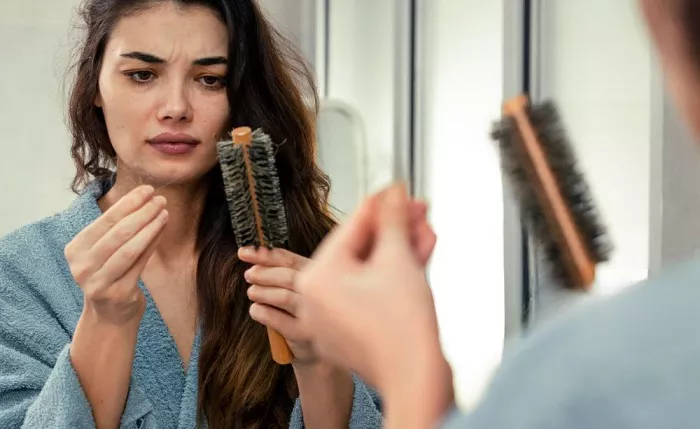For individuals living with ulcerative colitis (UC), symptoms like abdominal pain, diarrhea, and fatigue are commonly expected. However, hair loss—though less talked about—can also become an unwelcome complication. Experts estimate that up to one-third of people with inflammatory bowel diseases (IBD), including UC and Crohn’s disease, experience hair thinning or loss.
While not a primary symptom of UC, hair loss may stem from several related factors, including medication side effects, nutritional deficiencies, chronic illness, and emotional stress. Fortunately, most cases are temporary and manageable with the right care and support.
Why Ulcerative Colitis Can Lead to Hair Loss
Multiple Factors at Play
Hair loss in UC patients is often caused by a mix of underlying factors. Dr. Alexandra Gutierrez, medical director of the IBD Center at NewYork-Presbyterian/Columbia University, notes that while some causes are specific to IBD, others mirror those seen in the general population.
Dr. Supriya Rao, a gastroenterologist at Tufts University, adds that more than one factor is usually involved, making individualized treatment essential.
Common Causes of Hair Loss in UC Patients
1. Physical and Emotional Stress
Hair loss triggered by stress—known as telogen effluvium—is common among UC patients. “During a flare-up, hair follicles can prematurely enter the shedding phase,” explains Dr. Jessica Philpott of the Cleveland Clinic. This process typically occurs weeks after a stressful event or hospitalization, often causing patients to mistakenly blame their medications.
2. Medications
Drugs like mesalamine, methotrexate, azathioprine, steroids, and thiopurines—commonly used to manage UC—can have hair loss as a side effect. It’s important to review any concerns with your doctor before altering your treatment plan.
3. Nutritional Deficiencies
UC can impair nutrient absorption, leading to deficiencies in iron, protein, zinc, selenium, and B vitamins such as biotin and B12—all of which are critical for healthy hair. Dr. Sunanda Kane of the Mayo Clinic emphasizes that during illness, the body prioritizes vital organs, and hair and nails are often the last to recover.
4. Coexisting Conditions
Autoimmune diseases like alopecia areata are more common in people with UC and can also contribute to scalp hair loss.
How to Manage Hair Loss from Ulcerative Colitis
1. Consult Your Gastroenterologist
Hair loss is a valid concern. Your doctor can assess the root cause—whether it’s disease activity, medication, or nutritional imbalance—and recommend appropriate next steps, including possible referrals to a dermatologist.
2. Work With a Registered Dietitian
Diet plays a key role in hair health. A dietitian experienced with IBD can tailor a plan that addresses deficiencies, often confirmed via blood tests checking for ferritin, vitamin D, B12, and thyroid function.
3. Review Your Medications
If you suspect medication is a factor, discuss alternatives with your physician. But never stop treatment without medical guidance, as the disease itself may be the real cause of hair loss.
4. Manage Stress Effectively
Stress reduction is crucial for both UC management and hair regrowth. Techniques like mindfulness, yoga, therapy, and regular sleep (at least 7 hours a night) can help protect both gut and hair health.
5. Improve Lifestyle Habits
Adopting a Mediterranean diet, rich in anti-inflammatory foods and plant-based nutrients, may promote hair growth hormones. Avoid smoking, which constricts blood flow to hair follicles, and prioritize overall well-being.
6. Use Gentle Hair Care Practices
Limit heat styling, chemical treatments, and tight hairstyles. Use mild shampoos and conditioners to avoid damaging fragile hair.
7. Consider Dermatological Treatments
For persistent cases, treatments like minoxidil (Rogaine), finasteride, or red light therapy may be options. While research is limited for UC-specific hair loss, these are worth discussing with your dermatologist.
Hair loss is a common but often temporary issue for people with UC. With appropriate medical guidance and targeted lifestyle changes, it’s possible to restore healthy hair. Prioritizing nutrient intake, managing stress, and consulting healthcare providers can offer both relief and renewed confidence. For those navigating UC, improving hair health is one more step toward holistic healing.
Related Topics:
- Eat Yourself Beautiful: How Food Fuels Hair, Skin, and Nail Health
- Tight Hairstyles May Cause Hair Loss, Experts Warn
- Top Hair Growth Products for Men Backed by Experts


